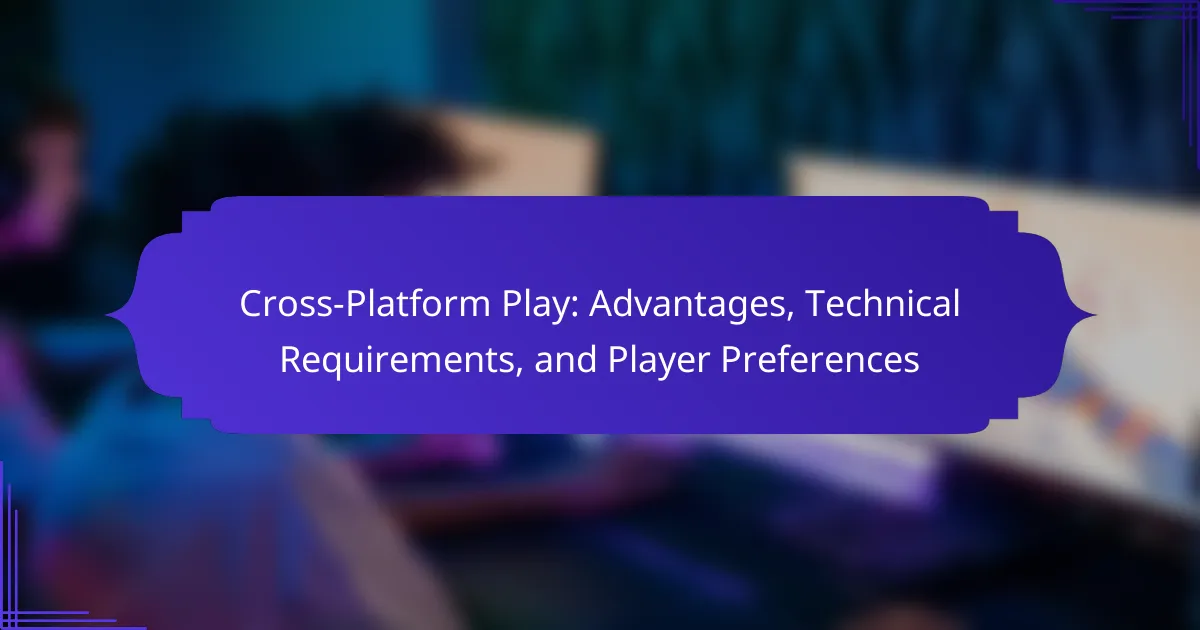Cross-platform play enhances the gaming experience by increasing accessibility and fostering inclusivity among players on different devices. It requires compatible hardware and internet connectivity for seamless interaction. Player preferences shape the development of cross-platform capabilities, influencing game genres and social interactions. Understanding these dynamics is crucial for maximizing player engagement and satisfaction in the gaming community.

What are the key advantages of cross-platform play?
Cross-platform play offers several key advantages, enhancing the gaming experience. It increases player accessibility, allowing gamers on different platforms to connect and compete. This broadens the player base, leading to shorter matchmaking times and a more vibrant gaming community. Additionally, it fosters inclusivity, enabling friends to play together regardless of their chosen devices. Cross-platform play can also extend the lifespan of games, as developers can maintain a single player community rather than splitting it across platforms.
How does cross-platform play enhance player engagement?
Cross-platform play significantly enhances player engagement by allowing gamers from different platforms to interact and compete. This inclusivity fosters a larger player base, leading to more dynamic gameplay and a vibrant community. Players can connect with friends regardless of their chosen gaming system, increasing social interaction and overall satisfaction. As a result, games that support cross-platform capabilities often experience longer lifespans and higher player retention rates.
Why is cross-platform play beneficial for game developers?
Cross-platform play benefits game developers by expanding their audience, enhancing player retention, and fostering community engagement. This feature allows players across different platforms to interact, leading to a larger player base and increased sales. Additionally, it helps developers maintain a consistent game experience, reducing fragmentation. Enhanced social connectivity can lead to longer play sessions and improved player satisfaction.
Which platforms support cross-platform play and how?
Many platforms support cross-platform play, including PlayStation, Xbox, PC, and Nintendo Switch. These platforms allow players to interact regardless of their device. Major games like Fortnite and Call of Duty: Warzone facilitate this feature, enhancing player engagement and community. Technical requirements often include a stable internet connection and compatible game versions. Player preferences lean towards cross-platform play for its inclusivity and expanded matchmaking options.

What technical requirements are needed for cross-platform play?
Cross-platform play requires compatible hardware, internet connectivity, and unified gaming accounts. Key technical requirements include cross-network compatibility, standardized game versions, and sufficient server capacity. These elements ensure seamless interaction between players on different platforms.
How do network infrastructure and latency affect cross-platform play?
Network infrastructure and latency significantly impact cross-platform play by affecting game performance and player experience. High latency can lead to delays, making gameplay frustrating. Reliable network infrastructure ensures stable connections, reducing lag and enhancing interaction. Players often prefer seamless experiences, making these factors crucial for successful cross-platform functionality.
What are the compatibility challenges across different platforms?
Compatibility challenges across different platforms often arise from technical limitations and player preferences. These challenges include differences in hardware capabilities, variations in game mechanics, and discrepancies in user interfaces. For instance, cross-platform play may be hindered by performance disparities between consoles and PCs. Additionally, players may prefer specific platforms due to exclusive features or community dynamics, complicating seamless interaction. Addressing these issues requires developers to create optimized experiences that cater to diverse systems while maintaining a unified gameplay environment.
Which tools and technologies facilitate cross-platform gaming?
Cross-platform gaming is facilitated by tools and technologies like game engines, cloud gaming services, and cross-platform APIs. Game engines such as Unity and Unreal Engine support multiple platforms, enabling developers to create games compatible across different systems. Cloud gaming services like NVIDIA GeForce Now and Google Stadia allow players to access games on various devices without requiring high-end hardware. Cross-platform APIs, such as PlayFab and Photon, streamline multiplayer interactions, enhancing user experience across different platforms.

How do player preferences influence cross-platform play?
Player preferences significantly shape cross-platform play by determining which games are developed for multiple systems. Preferences for game genres, social interaction, and competitive balance drive developers to create cross-platform capabilities. As a result, players can engage with friends across different platforms, enhancing the gaming experience. Unique preferences, like controller choice or performance metrics, also influence how well cross-platform play is implemented. Ultimately, understanding player preferences is essential for maximizing engagement and satisfaction in cross-platform gaming.
What demographics are most likely to engage in cross-platform gaming?
Younger players aged 18 to 34 are most likely to engage in cross-platform gaming. This demographic values accessibility and social interaction, driving the popularity of games that support multiple platforms. Additionally, studies show that male gamers are slightly more engaged than females in cross-platform play, though interest spans across genders. Players often seek diverse gaming experiences, enhancing community engagement and competition.
How do player attitudes towards competition vary across platforms?
Player attitudes towards competition vary significantly across platforms, influenced by community dynamics and game design. Console players often exhibit a strong competitive spirit, driven by exclusive titles and social interactions. In contrast, PC players may prioritize skill-based competition, valuing performance and customization. Mobile gamers often engage in more casual competition, focusing on accessibility and quick gameplay. These variations reflect the unique attributes of each platform, shaping player experiences and preferences in competitive environments.
Which genres benefit most from cross-platform play?
Action-adventure, first-person shooters, and multiplayer online battle arenas benefit most from cross-platform play. These genres thrive on diverse player bases, enhancing matchmaking and community engagement.
Action-adventure games, like “Fortnite,” leverage cross-platform play to connect players across consoles and PCs, ensuring a larger pool for cooperative experiences. First-person shooters, such as “Call of Duty,” gain competitive advantages as players can face off regardless of their platform. Multiplayer online battle arenas, including “League of Legends,” utilize cross-platform capabilities to foster vibrant communities and expand their player reach.
Overall, cross-platform play enhances user experience and satisfaction across these popular gaming genres.

What are the main limitations of cross-platform play?
Cross-platform play faces several limitations that affect player experience and game functionality. These include technical disparities between platforms, which can lead to performance issues. Additionally, varying player communities may result in mismatched skill levels, impacting competitiveness. Exclusive content on certain platforms can create imbalances, and differences in control schemes can hinder gameplay fluidity. Lastly, cross-platform play may face regulatory and policy restrictions from game developers or console manufacturers.
How do security concerns impact cross-platform interactions?
Security concerns significantly hinder cross-platform interactions by creating barriers to trust and accessibility. Players often worry about data breaches, cheating, and account safety, which can deter engagement. These concerns lead to fragmented communities and limit the potential for collaborative gameplay across different platforms. Moreover, technical measures to enhance security can complicate the user experience, further discouraging cross-platform play. As a result, addressing security issues is crucial for fostering a seamless and inclusive gaming environment.
What are the common complaints from players regarding cross-platform play?
Players commonly complain about matchmaking disparities, performance inconsistencies, and communication issues in cross-platform play. These concerns arise from differences in hardware capabilities and player skill levels. Additionally, some players express frustration over input lag and control scheme variations. These complaints highlight the need for improved optimization and balance across platforms.

What future trends can we expect in cross-platform gaming?
Cross-platform gaming will see increased player engagement, improved technology, and enhanced social connectivity. Players will benefit from seamless gameplay across devices, leading to a more unified gaming experience. Technical advancements will include better cloud gaming solutions and optimized cross-play features. Player preferences will shift towards games that support cross-platform play, emphasizing inclusivity and community.
How will emerging technologies shape cross-platform play?
Emerging technologies will significantly enhance cross-platform play by improving connectivity, reducing latency, and enabling seamless integration across devices. Innovations like cloud gaming and advanced APIs will allow players to interact regardless of their chosen platform. Enhanced graphics and processing power will further bridge gaps between consoles and PCs, creating a more unified gaming experience. As a result, player preferences will shift towards games that offer cross-platform capabilities, fostering a larger, more inclusive gaming community.
Which upcoming games are set to leverage cross-platform capabilities?
Several upcoming games are set to leverage cross-platform capabilities, enhancing player accessibility and interaction. Titles like “FIFA 24,” “Call of Duty: Modern Warfare III,” and “Fortnite” are confirmed to support cross-play. These games allow players across different platforms to compete and collaborate, increasing the gaming community’s size and diversity. This feature is increasingly becoming a standard, as it addresses player preferences for seamless gameplay experiences.
What best practices can enhance the cross-platform gaming experience?
To enhance the cross-platform gaming experience, prioritize seamless connectivity, consistent performance, and player engagement.
First, ensure robust server infrastructure to support diverse platforms, minimizing latency issues. Next, implement cross-play features that allow players to interact regardless of their device, fostering a unified gaming community. Regular updates and patches should be deployed to maintain game balance and fix bugs across all platforms. Lastly, consider player feedback to refine user experience, addressing preferences and concerns to keep the community engaged.
